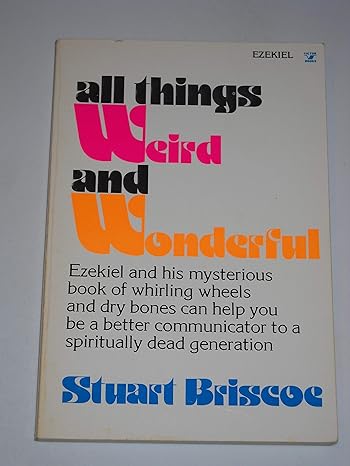All Things Weird and Wonderful

ISBN: 0-88207-749-X
Stuart Briscoe wants to bring life back into the Church. As a minister, of course, this is an appropriate desire. The author died on August 3, 2022, but although he is passed, the character he has chosen is appropriate regardless of his physical presence on Earth or not. Mr. Briscoe has picked Ezekiel to demonstrate how “weird and wonderful” YHVH is.
For most Christians, Ezekiel is a “wild ride” because it touches on mysteries that common Christianity has lost touch with or worse, treats as topics that are not to be discussed. Briscoe is an early author of this type of work, and so there are a few errors present. For one, he totally avoids the clear astrological associations being pointed to in Ezekiel by proxy of the creatures that Ezekiel first describes. (A zodiac wheel is, after all, a wheel.) Secondly, he is not certain why it is that YHVH strikes Ezekiel dumb. The details are included in the narrative:
“Moreover, I will make your tongue stick to the roof of your mouth so that you will be unable to speak and will not be a man who reprimands them, since they are a rebellious house.” –Ezekiel 3:26
Ezekiel’s imposed silence is to keep his anger from getting the better of him, and then speaking to Israel in a way that a reprover might. This is done presumably because YHVH all ready knows their hearts and this path simply is not going to be open to them. Briscoe might be playing at being a skeptic on this matter, since he is showing how YHVH sometimes proceeds by methods that appear contradictory.
Other than these minor points of contention, Briscoe does a laudable job in telling the story of Ezekiel in a contemporary way that makes the narrative accessible. The heaviest theological lifting he does is to show how the vision of Ezekiel’s temple is never actually constructed. He offers several theological views for why this might be so, but informs the reader he himself is not going to take the risk to explain the discrepancy.
The rest of his telling of the story of Ezekiel makes it clear that the life of the Prophet was not easy, and builds steady momentum and pressure on the point up until, as the astute reader of Ezekiel knows, his wife dies as part of the larger lesson to Israel. Another good point made as this is occurring is how Jeremiah is also doing something similar, and how YHVH is looking for someone to fill the gap. Briscoe points out apparently neither Jeremiah nor Ezekiel counts as these gap fillers, perhaps because they are not numbered as “people who have lived in Jerusalem”–at least not in the sense that the penitence YHVH is looking for is demanded or meaningful.
By the time Ezekiel is preaching to the dried bones that come back to life, it becomes clear that Briscoe is addressing the Christian churches in no small way. Many congregations are dead, and they talk about much but do little. This fact becomes something of an uncomfortable joke in the book for Briscoe. He is looking, it seems, for something a little like Ezekiel to happen where the houses that are “dead” come back to life and are made into an army. “Christian soldiers” would seem to be the call, although not necessarily in a military sense. Certainly, revival. Ezekiel, although a ministry first and foremost about “woes” becomes, after the woes have been rendered, a Prophet that is concerned with eventual revival. Some of what he sees, Briscoe lets us know, overlaps with John in the book of Revelation. It may be, we are reminded, that some of what Ezekiel saw was about the end times as opposed to anything that was to be prior.
The most impressive thing about this book is for the time in which it was written, it reveals much. The edition used for this review was written in 1979 although the first printing appears to be 1977. For any work like this to exist in the 70s as a Christian mainstream book is, indeed, wonderful and weird. One understands that Briscoe must have had some special calling in order to have been able to write it.
